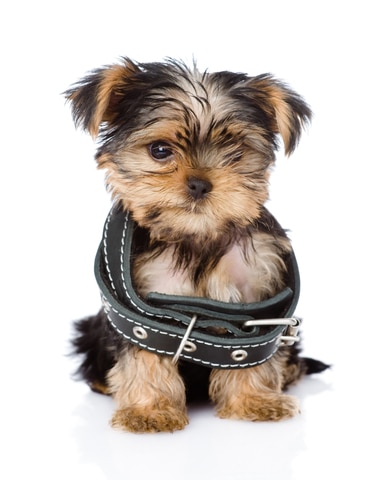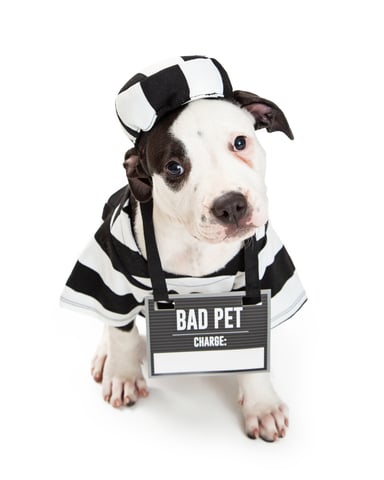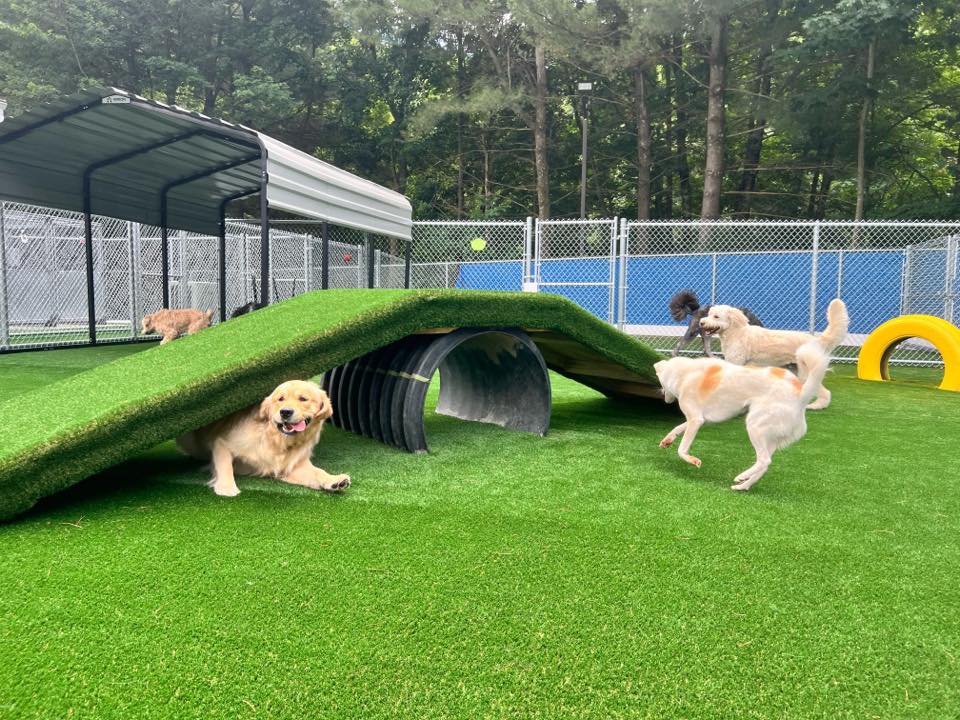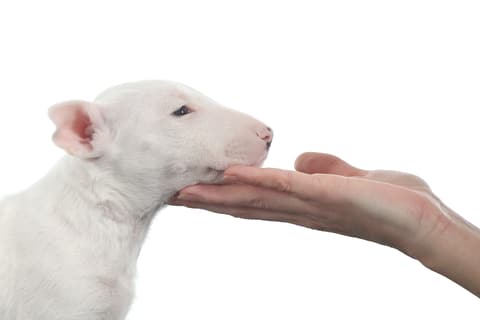A program for all dogs.

Our Earning Life’s Rewards program is for puppies and dogs of all ages. It’s for dogs who need training, for pushy dogs, for dogs that annoyingly demand attention, and those that don’t listen. We recommend starting this program with puppies to learn the “rules” of polite behavior in the household. It’s good for virtually all dogs, but is especially helpful with pushy, assertive dogs—the ones that are often (incorrectly) called “dominant”.
Earning Life’s Rewards is about teaching and requiring polite, mannered behavior. Easy to implement, Earning Life’s Rewards can and should automatically become part of your daily routine for your dog and for you.
Based on the simple fact that life itself is full of rewards for our dogs, Earning Life’s Rewards doesn’t require special “training time.” Think about the pleasures your dog enjoys every day: Eating a meal, getting a treat, going for a walk, playing ball, getting attention, being stroked and petted, romping with the kids, going outside, to the beach, for a ride—and the list goes on. A dog’s daily life is full of fun, tasty, enjoyable, and pleasurable things—life’s rewards!
Most dogs automatically receive these pleasures. They don’t have to do anything for us, yet we provide all these things. Oh sure, our dogs give us pleasure in return. We get companionship, love and enjoyment. But we derive this simply from having dogs with us.
What’s wrong with this?
If you’re like most people, you have a job—you work. You earn money to buy the food you eat. Put another way, you earned your meal! We teach children say “please” if they want a cookie—being polite to earn the cookie.
But most of us ask nothing of our dogs when we feed them. We just put the food dish down. We ask nothing when we take him out for a romp; or pick up a ball to play; or stroke and massage and groom him. Such generosity has three drawbacks:
- First, it can excuse (and even reward) pushy, obnoxious behavior. Consider that while you’re mixing your dog’s dinner, he’s jumping up on you. How do you stop his jumping up? You put down his dish! That reinforced his obnoxious pestering,
- Next, we aren’t taking advantage of opportunities to teach and reinforce manners.
- Finally, automatically giving your dog life’s rewards for doing nothing to earn them disregards canine guidelines for offering polite behavior. Such politeness is as important for dogs as it is for people.
Think of Earning Life’s Rewards as you would “earn a cookie” for a child. We teach a child to be polite. You can teach it to your dog, too.
Learning to say “Please”
Earning Life’s Rewards begins with the behavior that your dog automatically offers. Called a dog’s “default” behavior, for most dogs it is simply to sit. For some dogs it’s lying down; and for a rare few it’s another behavior. We met a wonderful Beagle at a seminar whose default behavior was sit-up-and-beg. He’d hold that position for minutes on end! Your dog’s default behavior is the position he most often assumes when he’s guessing what you want.
Think of your dog’s default behavior as the key to open the hypothetical (or literal) door to what she wants. Your dog’s default position is the same as a child saying “please.” That is, Sit equals “Please.” Teaching this lesson to your dog is as simple as waiting for your dog to sit (not telling him to, just waiting), marking this default behavior with “yes,” and reinforcing with what your dog has earned.
Here are some examples:
Earning your meal
Before you put your dog’s dish down for him/her to eat, stand straight holding the dish at waist or chest height, and look at your dog. Chances are your dog will assume his default position. If not, move the bowl over his head to lure him into a sit. (Note: Do not say “sit,” since the goal is for the dog to respond automatically. Wait for your dog to offer the behavior without being told.)
If your dog jumps up on you, calmly say “Uh” and turn your back to your dog. Once his feet are back on the floor, turn toward him and start again. Repeat this until he sits, say “Yes” put the dish down and walk away. Eating in peace is your dog’s reward.
Earning petting
Most dogs ask for attention or petting by nudging or pawing at your arm. Most of us react automatically, and just start petting. But here is another opportunity for another Earning Life’s Rewards.
For this one, use a cue—requesting your dog to sit or lie down to earn your petting. If he doesn’t respond, say “oops” or “nope” (unemotionally!) and fold your arms, removing his ability to nudge at them. The removal of your arms and your attention is “punishment” for his failing to say “please.”
After 5 seconds, cue “sit” again, in a calm, unemotional voice. Avoid the temptation to get louder or more insistent when you repeat the cue. You want your dog to respond to your calm, quiet tone of voice, even if it takes several tries to get the response.
Once your dog sits, the reward is your attention, which your dog has earned rather than demanded.
Earning “Go out”, “Go for a walk”, and “Go for a ride”
You want to take your dog for a walk, and your dog wants to go! She’s very excited and happy at the prospect of a nice romp. You pick up her leash and collar to put them on, and she’s spinning happily—too excited to sit still. But she can—honest! Self-control is something you can teach your dog as part of this program. Cue “sit,” and when she does, begin to put on her collar and leash. If she gets up, say “nope” and stand up straight. Repeat this until she sits still to have her equipment put on.
The first time you try this, it may take several tries. But don’t give up. Once you have been able to show your dog how she wins—how she gets to go outside by simply sitting still for a few seconds—she’ll catch on much faster the next time, and faster still with each repetition. Pretty soon you’ll have a dog that automatically sits and waits as you put on her jewelry to take her for a walk.
Other ways to Earn Life’s Rewards
As this program demonstrates, food is not the only reward in a dog’s life. Your dog’s life is full of rewards that can easily be used in this program. You are sending a simple message: You can have all the fun you want if you behave politely and ask nicely.
Here are some other suggestions, but don’t be limited by these. You’ll find more specific instructions in “Teaching Self-Control.”
- Lie down and wait for a treat
- Sit or stand still to greet you at homecoming (or to greet guests)
- Sit and wait for a ball to be thrown
- Sit and wait for the leash to be removed for a romp in the park
- Come for a treat
- Sit and wait when the door to outside is opened
- Sit and wait to get into the car
- Sit and wait to get out of the car. This one is important as it can be a lifesaver!
- Wait quietly (without barking) to earn anything that causes your dog to bark excitedly
Think of all the activities you control access to, and use them to reinforce your dog politely saying “please.” Far from minding this requirement, when your dog learns to earn life’s rewards, your dog will like it better, too. Dogs are happiest having a job to do. They like having rules, boundaries and functions to perform. Our Earning Life’s Rewards program is good for everyone—for you and for your dog. Try it. We know you’ll like it, and so will your dog.
If this program doesn’t work for you or you’re having problems with an assertive dog, talk with a professional trainer, preferably a marker trainer or positive trainer in your area, or contact us for help.







